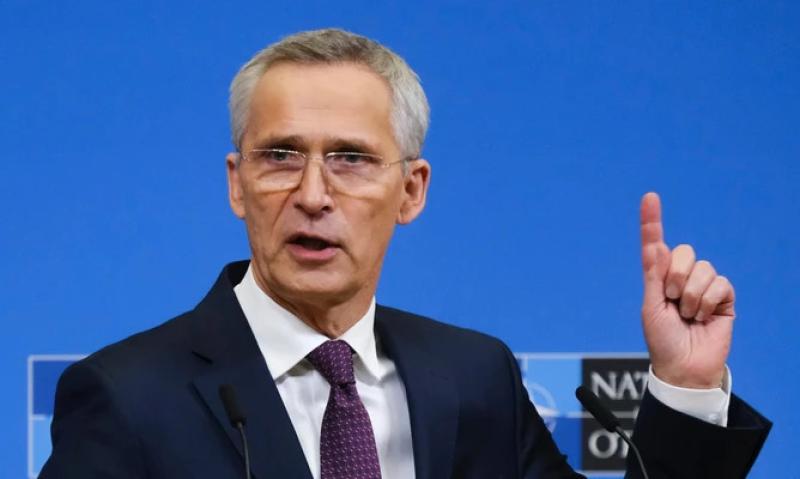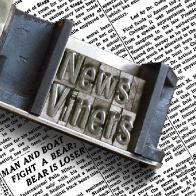When officials say the quiet part about Russia and NATO out loud
By: Branko Marcetic (Responsible Statecraft)


Joe Biden has thrown peace into the dumpster. Joe Biden has deliberately created geopolitical conditions that requires a stalemate; a quagmire of prolonged war. There cannot be peace with Russia.
We've all witnessed the kneejerk vilification of any discussion how the war started. The only allowed narrative is that it's all Russia's fault. But that constant drumbeat has also prevented any discussion of how the war ends. The war cannot be allowed to end. Ukraine will not allow a negotiated peace with Russia. And if Russia politically collapses then Ukraine's NATO membership becomes pointless.
Joe Biden has turned Ukraine into the greatest threat to NATO. NATO's continued existence depends upon perpetual war with Russia. Without NATO the influence of the United States in European affairs is diminished.

From the start of the Russian invasion of Ukraine, we've been told that the issue of NATO expansion is irrelevant to the war, and that anyone bringing it up is, at best, unwittingly parroting Kremlin propaganda, at worst, apologizing for or justifying the war.
So it was curious to see NATO Secretary General Jens Stoltenberg earlier this month say explicitly that Russian president Vladimir Putin launched his criminal war as a reaction to the possibility of NATO expanding into Ukraine, and the alliance's refusal to swear it off — not once or twice, but three separate times.
"President Putin declared in the autumn of 2021, and actually sent a draft treaty that they wanted NATO to sign, to promise no more NATO enlargement," Stoltenberg told a joint committee meeting of the European Parliament on September 7. "That was what he sent us. And [that] was a pre-condition for not invade [sic] Ukraine. Of course we didn't sign that."
"He went to war to prevent NATO, more NATO, close to his borders. He has got the exact opposite," Stoltenberg reiterated, referring to the accession of Sweden and Finland into the alliance in response to Putin's invasion. Their entry, he later insisted, "demonstrates that when President Putin invaded a European country to prevent more NATO, he's getting the exact opposite."
It's not clear if Stoltenberg was referring to the draft treaty Putin put forward in December 2021 and simply mixed up the seasons (the provisions of each are the same), or if he's referring to an earlier, as-yet-unreported incident. In any case, what Stoltenberg claims here — that Putin viewed Ukraine's NATO entry as so unacceptable he was willing to invade to stop it, and put forward a negotiating bid that might have prevented it, only for NATO to reject it — has been repeatedly made by those trying to explain the causes of the war and how it could be ended, only to be dismissed as propaganda.
The only logical conclusion, if we're to listen to the hawks, is that the man in charge of the very alliance helping Ukraine defend itself from Putin is, in fact, working for the Russian leader and spreading his propaganda.
This isn't the only instance from a member of the NATO establishment. Testifying to the Senate Armed Services Committee in May this year, U.S. Director of National Intelligence Avril Haines said, alongside Defense Intelligence Agency Director Lt. Gen. Scott Berrier, that "we assess that Putin probably has scaled back his immediate ambitions to ... ensuring that Ukraine will never become a NATO ally." Earlier in her testimony, Haines had said that Putin's invasion had backfired by "precipitating the very events he hoped to avoid such as Finland's accession to NATO and Sweden's petition to join."
Likewise, in a March 2023 interview with the German newspaper Die Zeit, Russia expert Fiona Hill — who served as an intelligence analyst under Presidents George W. Bush and Barack Obama, as well as on the National Security Council under President Donald Trump — told the paper that "it was always obvious that NATO's enlargement to Ukraine and to Georgia was a provocation for Putin." Yet the opposite claim, that the invasion was entirely "unprovoked," has become such an article of faith in Western discourse that this word is ubiquitous in news reports and official statements on the war.
On a similar note, an August 2022 Washington Post report based on "in-depth interviews with more than three dozen senior U.S., Ukrainian, European and NATO officials" reported four separate instances of high-ranking Russian officials telling their U.S. counterparts in the lead-up to the war that NATO expansion was a core part of the grievances motivating Moscow's threatening troop build-up. That included Putin himself, who told President Joe Biden in a December 2021 video call "that the eastward expansion of the Western alliance was a major factor in his decision to send troops to Ukraine's border," according to the report.
To some extent, this isn't surprising. As the analysts, journalists, politicians, and others pointing to NATO expansion as a leading cause of the war have copiously documented, the decades before the invasion saw countless members of the Washington national security establishment, from famed Cold War strategist George Kennan and current CIA Director William Burns to a parade of diplomats, military officials, NATO leaders and even Biden himself, warn that the alliance's eastward creep was a fundamental source of Russian unhappiness and that it would provoke Russian hostility and aggression — or even spark war.
But what was once uncontroversial and widely acknowledged before the invasion has become verboten since it started in February 2022, as debate or dissent on the matter of the war and U.S. and European policy toward it have been clamped down on, often via vicious McCarthyite tactics. The topic has become verboten, that is, unless you happen to be a U.S. or NATO official.
It's not just individual officials, either. Elements of this supposedly Kremlin-originating argument also pop up in major U.S. government documents. Take, for instance, the Annual Threat Assessment put out by the Office of the Director of National Intelligence a year after the invasion started. Meant to reflect the "collective insights" of Washington's various intelligence agencies, the report states that it expects Moscow to continue "to insert itself into crises when it sees its interests at stake, the anticipated costs of action are low, it sees an opportunity to capitalize on a power vacuum, or, as in the case of its use of force in Ukraine, it perceives an existential threat in its neighborhood that could destabilize Putin's rule and endanger Russian national security."
Yet today, anyone else saying that Putin or the Russian establishment genuinely view Ukraine's growing integration into NATO as a security threat is liable to receive all manner of scurrilous accusations.
As with officials' words, you can find similar points in documents before the war. A 2020 U.S. Army War College paper states that "future admissions to NATO for states in Russia's near abroad will likely be met with aggression." A 2019 paper from the Pentagon-funded RAND Corporation — and sponsored by the Army Quadrennial Defense Review Office — states explicitly that the Kremlin's fear of a direct military attack by the United States is "very real," plus that "providing more U.S. military equipment and advice [to Ukraine in the war on the Donbas] could lead Russia to increase its direct involvement in the conflict and the price it pays for it," including by "mounting a new offensive and seizing more Ukrainian territory." The 2017 National Security Strategy states outright that "Russia views the North Atlantic Treaty Organization (NATO) and European Union (EU) as threats."
It's the central paradox of the current war discourse: What is widely acknowledged by Western policymakers and officials in the halls of power, who rely on an evidence-based understanding of the world to shape foreign policy, is unspeakable anywhere outside of them.
What's at stake is more important than just finger-pointing and apportioning guilt. By steadfastly refusing to understand one of the foundational causes of the war and the U.S. and NATO role in it, we will continue to fail to end it and to secure a lasting peace, leading to many more Ukrainian deaths, and to many more years of living in the shadow of global catastrophe.

Tags
Who is online
48 visitors


Discussing the start of the war now only distracts from recognizing that the war cannot be allowed to end. Joe Biden has made a negotiated peace impossible. And a Russian defeat makes NATO irrelevant and diminishes US influence in Europe.
If Ukraine is partitioned to negotiate a peace then Joe Biden gets the blame. If Ukraine actually defeats Russia then Joe Biden doesn't get any credit. Joe Biden failing to negotiate with Russia before the invasion ensured that the United States loses no matter how the war turns out. Joe Biden didn't do anything to prevent war so why does Europe need the United States?
Because they don't want to pay for anything; and are not willing to do the dirty work themselves.
The US does all of the heavy lifting for Europe in terms of military and aid.
There will always be another Libya (French and British oil contracts) or Ukraine (Wheat, raw materials, and vast political corruption and money laundering opportunities); for the US to intercede on their behalf.
War is good for business. The US needed a war to replace Afghanistan; and Brandon gave us a doozey.
Isn't that what the Democrats and the left claimed Trump would do? Funny how this turned out.
It wasn't only Democrats. Neoliberals around the world warned that the global order was threatened by Trump. Neoliberals claimed that Trump would end civilization as we know it.
These neoliberals never explained what Russia got from Trump being a stooge. These neoliberals never explained what North Korea got from Trump being a buddy of Kim Jong Un. These neoliberals never explained what all the autocrats and dictators got from Trump's appeasement.
The world didn't end while Trump was in the White House. But the world has gone to shit with Joe Biden leading the free world. And neoliberals don't have a explanation for why that is.